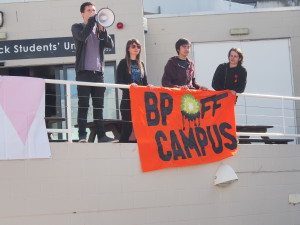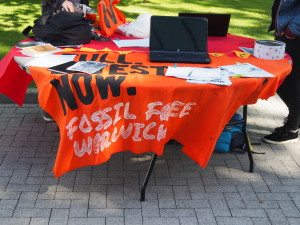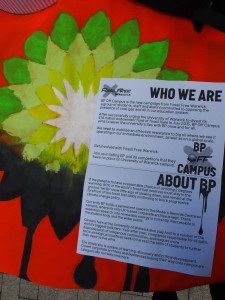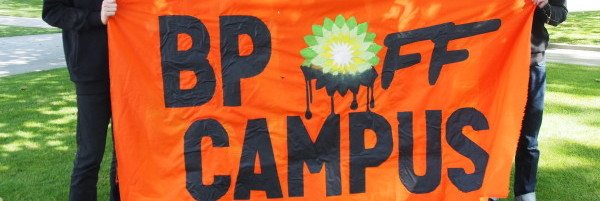Why we want BP Off Campus
[dropcap]O[/dropcap]n 8 July, 2015, the University of Warwick committed to stop investing in coal, oil and gas companies. This followed a hard-fought two year campaign by Fossil Free Warwick University, and was the first signal that Warwick is willing to start taking the tough decision necessary to play its part in one of the greatest fights of our time: the fight to break the power of the fossil fuel industry and take action on climate change.
But whilst – collectively – divestment has great power, it is a mostly symbolic gesture, a stepping stone to the kind of concrete action needed to begin prying the encrusted juggernaut of the fossil fuel industry off our public institutions.
On Saturday, Fossil Free Warwick laid down a new challenge to the University management. BP, one of the UK’s largest petroleum companies, has a serious presence at our institution – their only UK-based corporate archive is in the middle of our campus, for instance. It’s completely controlled by BP, who decide who can come in, what documents can be viewed, and how they’re used.
Thus, we’re launching our ‘BP Off Campus’ campaign, and calling on Warwick to completely sever its links with the company. We’ve demanded that Warwick’s management initiate talks with BP by Nov. 30, in time for the huge climate summit happening in Paris at the end of the year.
This is no small ask. The BP Archive has been on campus for 22 years, and has another 23 to run on its lease. But with enough creative organising and the weight of the student body behind us, we think we can win once again. After all, given the rapidity with which we need to transition to a renewable energy system – and the fact that around four-fifths of fossil fuels need to stay in the ground to avoid catastrophic climate change – BP hopefully won’t exist as a company in 23 years.
 Why BP? They were just placed top of a list of European companies blocking the transition to a clean economy. They’re currently being sued in a British court for alleged complicity in the kidnap and torture of a union activist in Colombia. And they’re responsible for the single largest off-shore oil disaster in Earth’s history.
Why BP? They were just placed top of a list of European companies blocking the transition to a clean economy. They’re currently being sued in a British court for alleged complicity in the kidnap and torture of a union activist in Colombia. And they’re responsible for the single largest off-shore oil disaster in Earth’s history.
This is a mere taste of the litany of crimes, propaganda and environmental destruction wrought by this most vicious of companies. Are any students really comfortable with their presence right at the heart of our community?
Allowing such a corporation to so viscerally occupy half of one the finest buildings on campus – the Modern Records Centre – is to normalise their presence, legitimate their behaviour, and lend them the respectability an institution like the University of Warwick can confer.
We also know that the Archive is no mere academic vessel, but a propaganda tool for whitewashing the company. BP states on its website that, “These records are not only used by the Company to support its primary business activities, but also to enhance its reputation.” The Archive staff openly state that their “primary focus is on supporting the BP businesses globally”. Peter Housego, the current Archive manager, has spoken publically about how he used the Archive to persuade an academic researcher to write a sympathetic article about the company. BP maintains an absolute veto over the use of any material it deems “commercially sensitive,” and billions of pounds of vital renewable research conducted by the company in the 80s and 90s is hidden away from researchers.
For all this, according to documents from the Land Registry, BP pays precisely no rent.
Of course, if BP wants to hand over the Archive to the control of University staff, who can allow researchers and journalists to sift through the renewable energy research for the public good, we’d welcome it. What we want is the presence of the company gone from our campus; what we object to is the closeness of the relationship between BP and Warwick. Analogously, we’d be happy to have an academic archive on Russian intelligence in our library, but not for Russian intelligence to completely control and run the archive on our campus.
Many have questioned where Fossil Free campaigns can go after achieving the holy grail of divestment. We are proving that they can intensify the effort to smash the rapacious coal, oil and gas companies which have hijacked our governance mechanisms, polluted our atmosphere and distorted public debate.
Forcing BP off our campus would make a real statement, cause physical disruption to their activities, and probably generate international media coverage. Warwick has inadvertently set itself up with a sensational opportunity to strike a serious blow to the legitimacy of the industry pillaging our planet.
Connor Woodman is a final year PPE student and co-coordinator of Fossil Free Warwick. You can find out more on their campaigns at fossilfreewarwick.org, and sign their petition against the presence of BP here. You can attend their ‘Divestival’ to meet the team at 5PM Thursday Oct. 15 in S0.08.

Comments